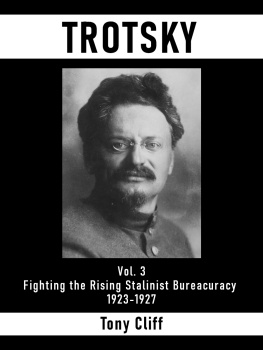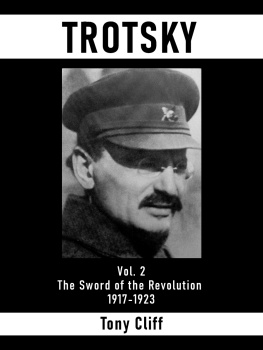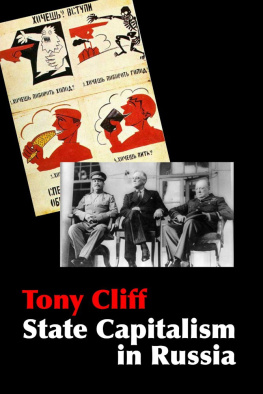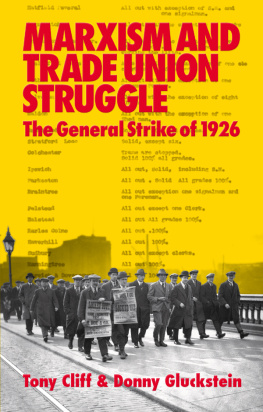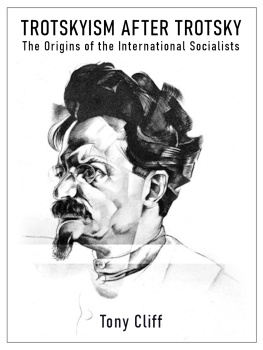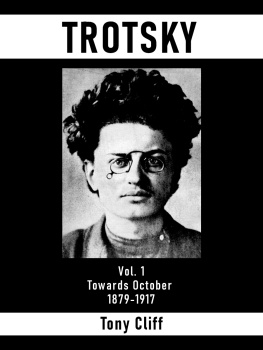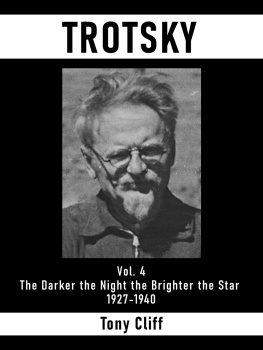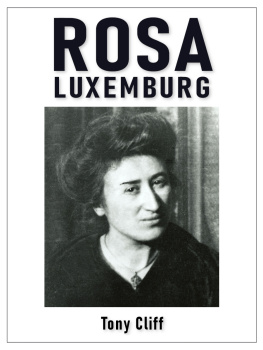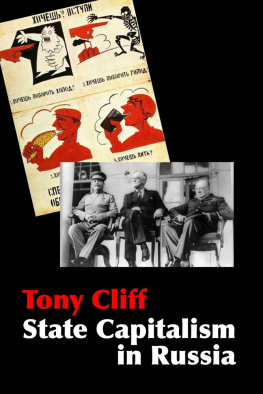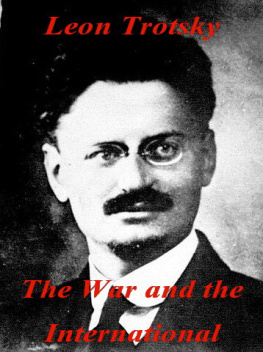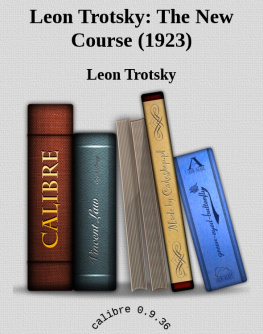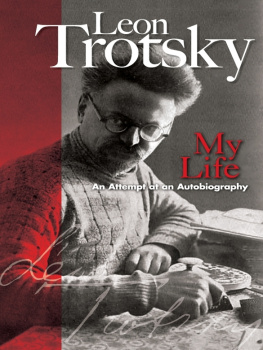Tony Cliff - Trotsky: Vol. 3. Fighting the Rising Stalinist Bureaucracy 1923-1927
Here you can read online Tony Cliff - Trotsky: Vol. 3. Fighting the Rising Stalinist Bureaucracy 1923-1927 full text of the book (entire story) in english for free. Download pdf and epub, get meaning, cover and reviews about this ebook. year: 2020, publisher: Marxists Internet Archive, genre: Politics. Description of the work, (preface) as well as reviews are available. Best literature library LitArk.com created for fans of good reading and offers a wide selection of genres:
Romance novel
Science fiction
Adventure
Detective
Science
History
Home and family
Prose
Art
Politics
Computer
Non-fiction
Religion
Business
Children
Humor
Choose a favorite category and find really read worthwhile books. Enjoy immersion in the world of imagination, feel the emotions of the characters or learn something new for yourself, make an fascinating discovery.
- Book:Trotsky: Vol. 3. Fighting the Rising Stalinist Bureaucracy 1923-1927
- Author:
- Publisher:Marxists Internet Archive
- Genre:
- Year:2020
- Rating:3 / 5
- Favourites:Add to favourites
- Your mark:
- 60
- 1
- 2
- 3
- 4
- 5
Trotsky: Vol. 3. Fighting the Rising Stalinist Bureaucracy 1923-1927: summary, description and annotation
We offer to read an annotation, description, summary or preface (depends on what the author of the book "Trotsky: Vol. 3. Fighting the Rising Stalinist Bureaucracy 1923-1927" wrote himself). If you haven't found the necessary information about the book — write in the comments, we will try to find it.
Trotsky: Vol. 3. Fighting the Rising Stalinist Bureaucracy 1923-1927 — read online for free the complete book (whole text) full work
Below is the text of the book, divided by pages. System saving the place of the last page read, allows you to conveniently read the book "Trotsky: Vol. 3. Fighting the Rising Stalinist Bureaucracy 1923-1927" online for free, without having to search again every time where you left off. Put a bookmark, and you can go to the page where you finished reading at any time.
Font size:
Interval:
Bookmark:
1923-1927
Bookmarks, London, 1991.
Transcribed by Martin Fahlgren (July 2009)
Marked up by Einde OCallaghan for the Marxists Internet Archive
Converted to ebook format June 2020
Cover photograph: Trotsky, from the cover of the magazine Prozhektor, January 1924
Wikimedia Commons
At the time of ebook conversion this title was out of print.
Other works of Tony Cliff are available in hardcopy from:
https://bookmarksbookshop.co.uk/
Several people have helped in the writing of this book. Many thanks are due to Chris Bambery, Alex Callinicos, Donny Gluckstein and Chris Harman and John Rees for their advice and suggestions. I owe a debt to Ahmed Shawki for help in locating material. Chanie Rosenberg deserves special thanks for writing Chapter Five, Trotsky on Culture, for participating in the editing of the manuscript and for typing it. Thanks are due to John Molyneux for expert critical comment and most valuable stylistic suggestions, and Duncan Blackie for editing.
Tony Cliff
25 April 1991
Tony Cliff was a member of the Socialist Workers Party in Britain, and wrote many previous books. The first two volumes of this biography, Trotsky: Towards October 1879-1917 and Trotsky: The Sword of the Revolution 1917-1923, were published by Bookmarks in July 1989 and July 1990 respectively. His other books include the classic State Capitalism in Russia (1974) and two previous political biographies: Rosa Luxemburg (1959) and Lenin (in three volumes 1975-79).
THE PRESENT volume deals with the interval separating two decisive periods of Trotskys life.
In the years of the revolution and civil war Trotsky was leading millions. Together with Lenin he was the leader of the Bolshevik Party, the government and the Communist International. At the end of 1927 Trotsky was expelled from the Party, exiled first to Alma Ata in the far east of the USSR, then banished from the country. From 1927 until his assassination in 1940 he was isolated and led only tiny groups of supporters throughout the world. The intervening years 1923-7 saw him moving into opposition against the rising Stalinist bureaucracy.
During the revolution and civil war Trotsky was in his element. His voice articulated the aspirations of the fighting revolutionary workers. From 1927 onward hardly any workers listened to him.
The fate of his main antagonist Stalin was the exact opposite.
During 1917 Stalin played a minor role. Dull as a writer and poor as an orator, without the spark of imagination needed to fire the masses (whom anyway he did not trust), Stalin lived a shadowy existence at the time of the great revolutionary events. As Sukhanov, the perspicacious chronicler of the revolution writes: Stalin doing his modest activity in the Executive Committee [of the Soviets] produced and not only on me the impression of a grey blur, looming up now and then dimly and not leaving any trace. There is really nothing more to be raid about him.
John Reed, throughout his brilliant Ten Days that Shook the World, did not record one speech or action of Stalin.
Many writers have explained Stalins victory over Trotsky in terms of his superior organisational abilities. This is a ridiculous proposition given Trotskys known role in organising the October revolution and in building and leading the many-millioned Red Army.
It was changes in the objective conditions, namely the retreat of the revolution, that explains the rise of Stalin. Marxism recognises the important role of the individual in history. But it sees him or her as a link in a chain of objective conditions. In The Eighteenth Brumaire of Louis Bonaparte Marx showed how the class struggle created the circumstances and the conditions that permitted a mediocre and vulgar personage to play the role of a hero. Elsewhere Marx wrote: Every social epoch needs its great men, and when it does not find them it invents them Stalin perfectly fitted the period of reaction. Had he not existed, someone similar to him would have emerged to play this role.
A period of reaction will always find a figurehead because reaction relies on all the old habits of thought, the deference and lack of confidence of the workers, their submission to routine, the natural conservatism of the state bureaucracy and so on. But, as Trotsky noted of Lenins role in October, a period of advance and especially of revolution cannot simply wait on history to invent its great men.
The bureaucratic degeneration of the Russian revolution and the rise of Stalin were rooted in Russias economic and social backwardness and its isolation. The civil war brought about the disintegration of the Russian proletariat as a class. Its regroupment was further weakened by the defeat of the international proletariat in the German revolutions of 1918 and 1923, the British general strike in 1926 and the Chinese revolution of 1925-27. The workers were exhausted and depressed. This was the background for the rise of the bureaucracy with Stalin at its head.
It was the workers weariness that led them to accept Stalins doctrine of socialism in one country, which fitted the popular craving for stability, safety and peace. The same weariness made them indifferent to Trotskys theory of permanent revolution, which looked like a call for risky experiments.
The support of a minority of the working class was not enough for Trotsky to win; he needed the active and conscious following of the majority. For Stalin minority support was enough to win so long as the majority were passive and acquiescent.
Trotsky, who during the revolution and civil war motivated millions, now found himself out in the cold, unable to rouse the workers. While many thousands of workers were ready to give their lives at his call during the civil war, now they were hardly ready even to listen to him.
Men make their own history, though not in circumstances of their own choosing. For Trotsky the objective circumstances were not only the material, economic and social conditions at the time, but also the level of consciousness of the working class. This gravely circumscribed his ability to resist Stalinist reaction.
The workers retreat was accompanied by the danger of capitalist restoration. In the years of the New Economic Policy, NEP, with the increasing strength of the kulaks and NEPmen, this threat was by no means a figment of Trotskys imagination and, combined with the weariness of the mass of workers, restricted Trotskys ability to act. His fear of splitting the party and encouraging counter-revolution was very real.
In the years 1923-27 Trotskys genius co-existed with a serious weakness. His Achilles heel can be summed up by one word: conciliationism.
His genius is illuminated in the wealth of his writings. He reacted to every event at home and abroad. His strategic and tactical mastery is exceptional. From this period we inherit a body of writings that is unsurpassed as a rich source of applied Marxism. He also made the first powerful attempt at an historical materialist analysis of Stalinism. (All subsequent serious analyses, even if deviating from his, have taken his as a point of departure.) At the same time his sure touch, sharpness and iron will co-existed with zigzags and compromises with his partners in the United Opposition, Zinoviev and Kamenev. Conciliating these two meant indirectly conciliating the leading group in the party and state.
This intransigence and strict adherence to revolutionary principles alongside volatility and a fudging of the issues is reminiscent of the earlier period between 1903 and his joining the Bolsheviks in July 1917, when Trotsky combined brilliant revolutionary politics and theory above all the theory of permanent revolution with conciliation with the Mensheviks.
Font size:
Interval:
Bookmark:
Similar books «Trotsky: Vol. 3. Fighting the Rising Stalinist Bureaucracy 1923-1927»
Look at similar books to Trotsky: Vol. 3. Fighting the Rising Stalinist Bureaucracy 1923-1927. We have selected literature similar in name and meaning in the hope of providing readers with more options to find new, interesting, not yet read works.
Discussion, reviews of the book Trotsky: Vol. 3. Fighting the Rising Stalinist Bureaucracy 1923-1927 and just readers' own opinions. Leave your comments, write what you think about the work, its meaning or the main characters. Specify what exactly you liked and what you didn't like, and why you think so.

